Nicole Eisenman
Al-Ugh-Ories
04 May - 26 Jun 2016
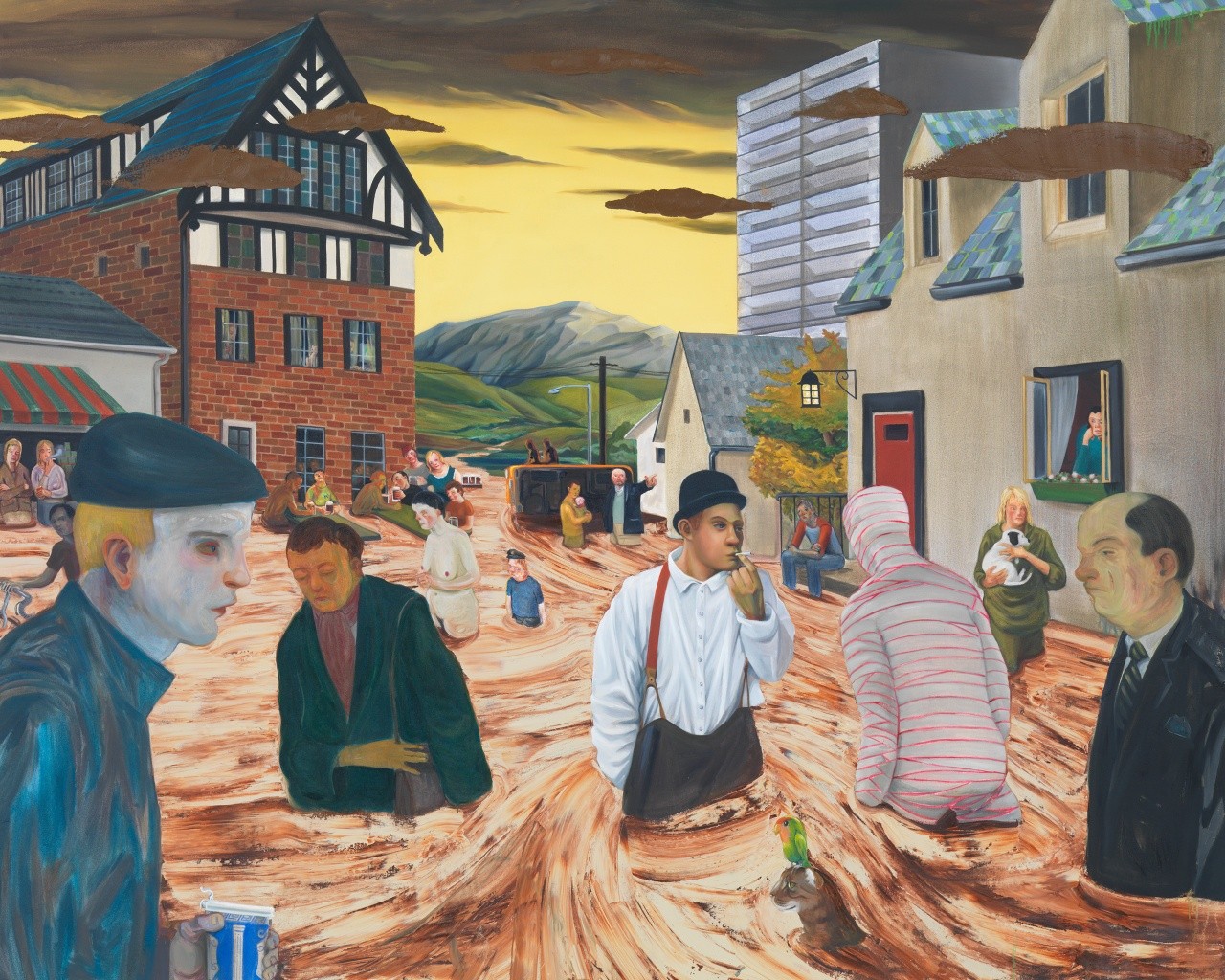
Nicole Eisenman, Coping, 2008. Oil on canvas, 65 × 82 in (165.1 × 208.3 cm). Courtesy the artist; Galerie Barbara Weiss, Berlin; and Susanne Vielmetter Los Angeles Projects. Photo: © Carnegie Museum of Art
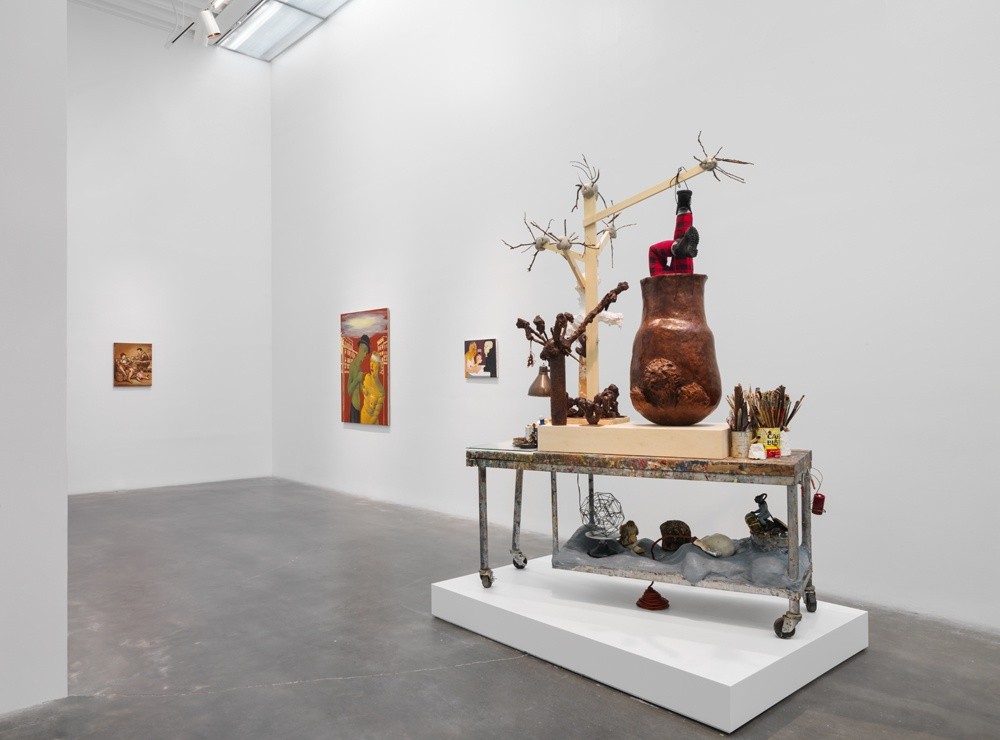
“Nicole Eisenman: Al-ugh-ories,” 2016. Exhibition view: New Museum. Photo: Maris Hutchinson / EPW Studio
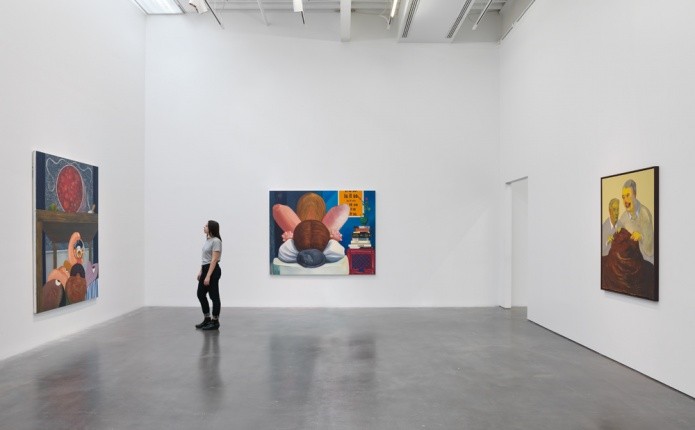
“Nicole Eisenman: Al-ugh-ories,” 2016. Exhibition view: New Museum. Photo: Maris Hutchinson / EPW Studio
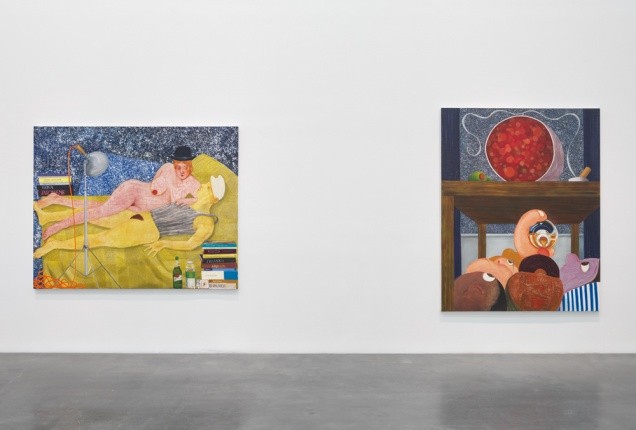
“Nicole Eisenman: Al-ugh-ories,” 2016. Exhibition view: New Museum. Photo: Maris Hutchinson / EPW Studio
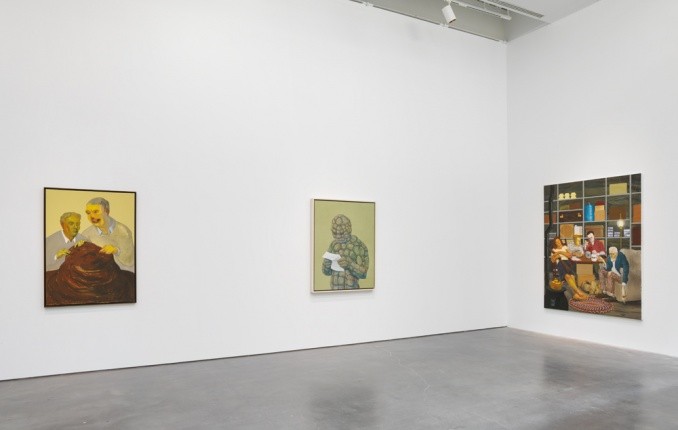
“Nicole Eisenman: Al-ugh-ories,” 2016. Exhibition view: New Museum. Photo: Maris Hutchinson / EPW Studio
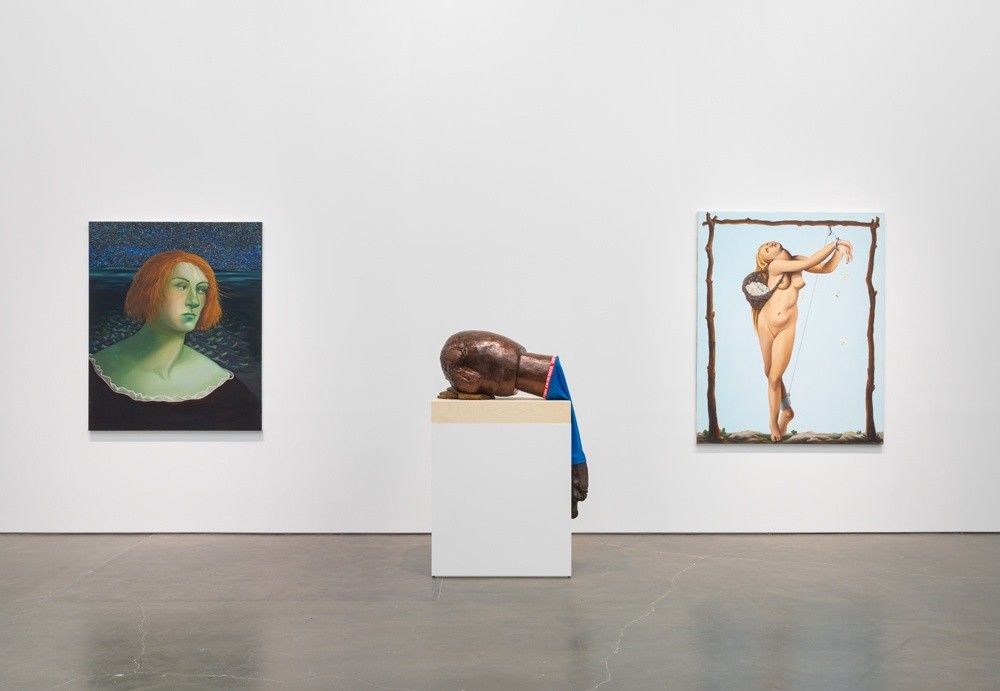
“Nicole Eisenman: Al-ugh-ories,” 2016. Exhibition view: New Museum. Photo: Maris Hutchinson / EPW Studio
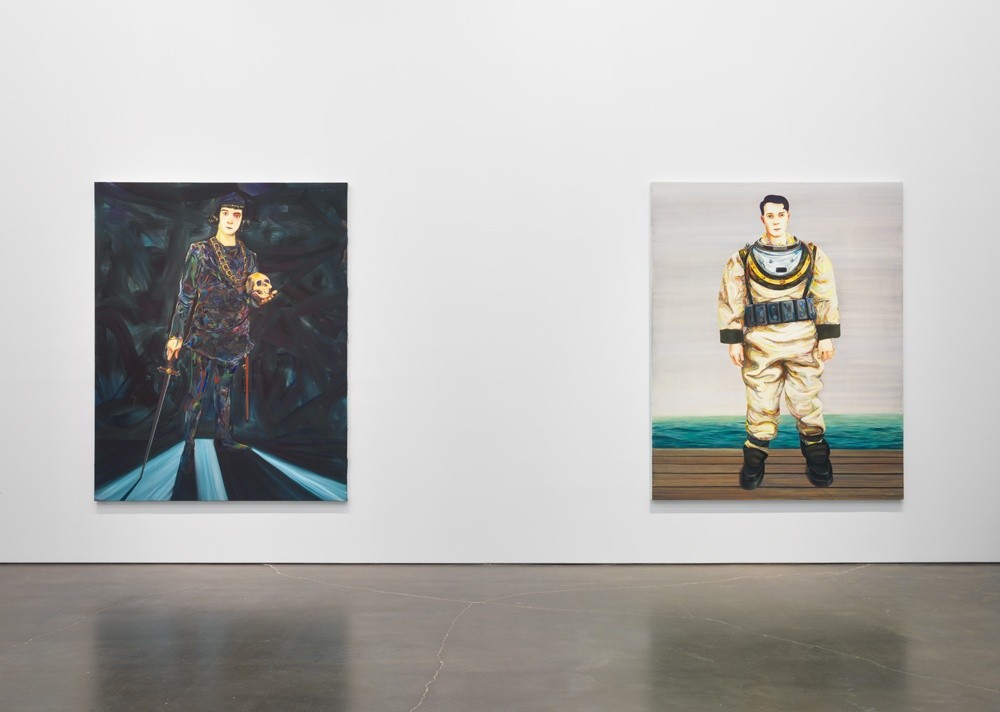
“Nicole Eisenman: Al-ugh-ories,” 2016. Exhibition view: New Museum. Photo: Maris Hutchinson / EPW Studio
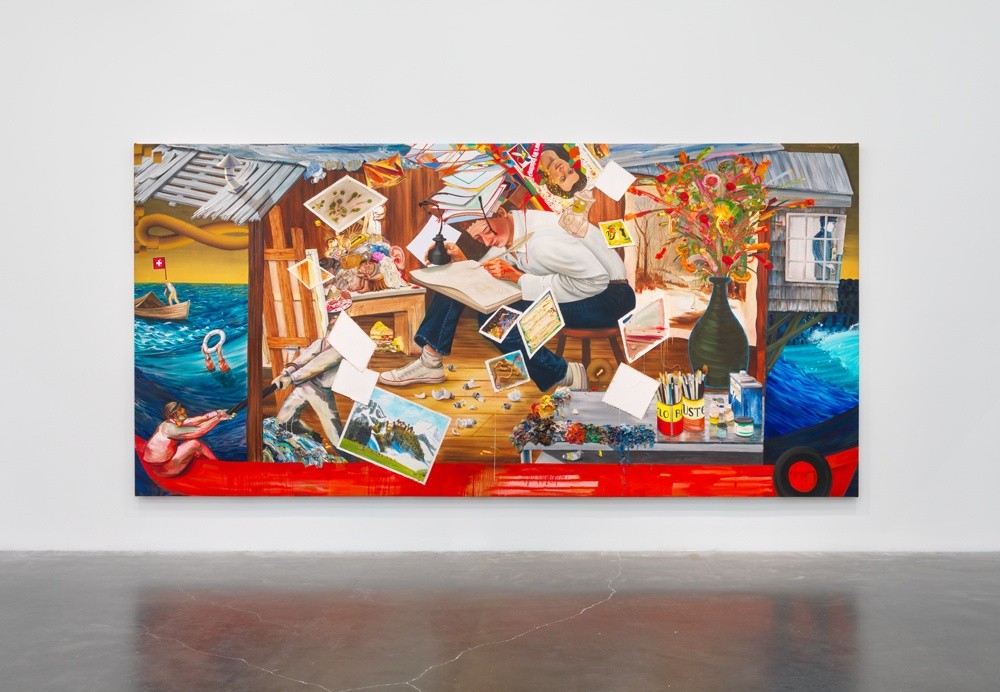
“Nicole Eisenman: Al-ugh-ories,” 2016. Exhibition view: New Museum. Photo: Maris Hutchinson / EPW Studio
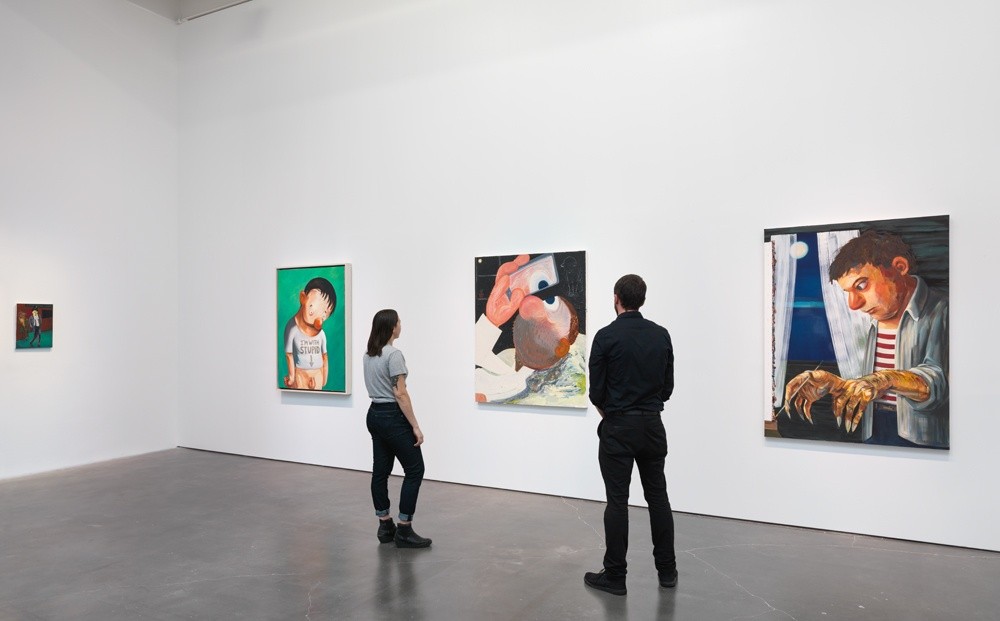
“Nicole Eisenman: Al-ugh-ories,” 2016. Exhibition view: New Museum. Photo: Maris Hutchinson / EPW Studio
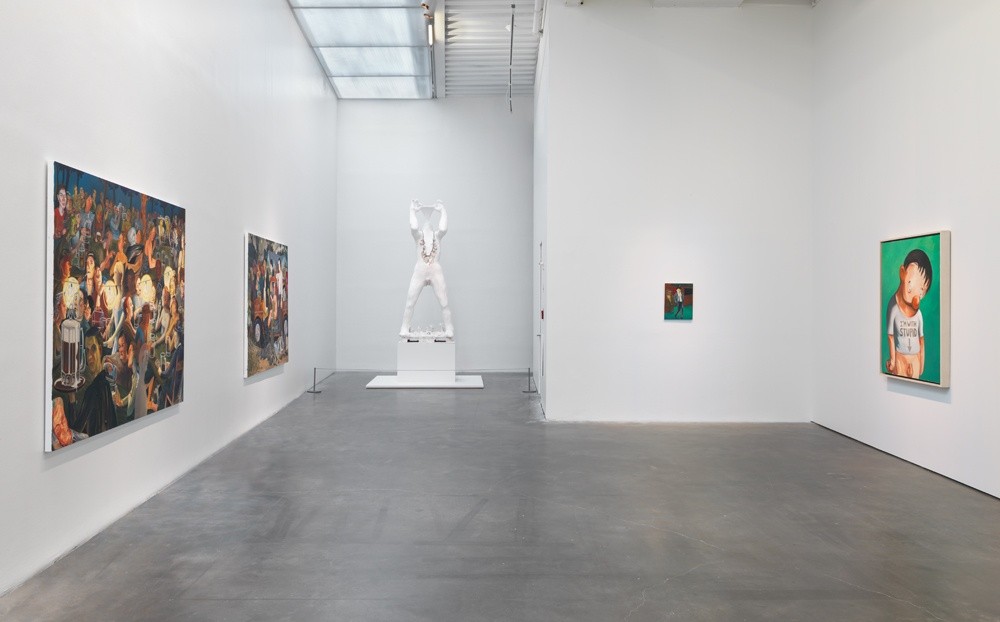
“Nicole Eisenman: Al-ugh-ories,” 2016. Exhibition view: New Museum. Photo: Maris Hutchinson / EPW Studio
NICOLE EISENMAN
Al-Ugh-Ories
4 May - 26 June 16
The New Museum presents the first New York survey show of the work of Nicole Eisenman (b. 1965, Verdun, France).
This show marks the first New York museum survey exhibition of Eisenman’s work and provides an in-depth look at the symbolic nature of the artist’s most striking depictions of individuals and groups—from intimate portraits to more complex narrative scenes. One of the most important painters of her generation, Eisenman (b. 1965, Verdun, France) has developed a distinct figurative language that combines the imaginative with the lucid, the absurd with the banal, and the stereotypical with the countercultural and queer. “Nicole Eisenman: Al-ugh-ories” highlights how allegory permeates her oeuvre and how she fluidly ties the fictional to the autobiographical and the past to the present.
From the outset of her career, Eisenman’s investment in painting has led to frequent experimentation in other mediums, and her practice is characterized by visible shifts that mark her effort never to become too comfortable with any one approach to painting. Eisenman’s preoccupation with the figure and the complexity of its gestures and form has resulted in mesmerizing portraits of an array of characters who range from friends and fellow New Yorkers, to imagined heroines, to tragic losers. From Success to Obscurity (2004) depicts a monstrous superhero contemplating the contents of a letter it holds in its hands and alludes, perhaps, to the fragility of fame and fortune. In Hamlet (2007), a depiction of Shakespeare’s beautiful and frail Danish prince with lowered sword, Eisenman ponders the possibility of a sensitive and cautious leader at a time when the US was in the final year of George W. Bush’s presidency. Similarly inspired by contemporary events, the large group portrait The Triumph of Poverty (2009), painted in the aftermath of the 2008 financial crisis, is a reimagining of a lost sixteenth-century painting of the same title by Hans Holbein. “Nicole Eisenman: Al-ugh-ories” also includes one of the artist’s large-scale plaster figures, which she began producing in recent years, and two new oversize wax heads made specifically for this exhibition.
In her often-narrative compositions Eisenman draws as much from art history as from popular culture, and her works, while accessible and humorous, occasionally yield critical and poignant images of contemporary life. Eisenman freely references painters as varied as Giotto, Francisco de Goya, Paul Cézanne, Pablo Picasso, and Edvard Munch, but uses wit and irreverence to undermine historical hierarchies and to make her depictions of familiar events such as eating, sleeping, walking, or making love appear distinctly contemporary. While Eisenman’s subjects and narratives have always been in conversation with their time, her work remains timeless and captivating because of her ability to portray the essence of human desire as equally raw and awkward.
Nicole Eisenman was born in Verdun, France, in 1965 and lives and works in New York. In 2014 the Contemporary Art Museum St. Louis mounted a major exhibition of her work, “Dear Nemesis, Nicole Eisenman 1993–2013,” which traveled to the Institute of Contemporary Art, Philadelphia, in late 2014 and to the Museum of Contemporary Art San Diego in 2015. Additional solo presentations of her work have taken place at the Jewish Museum, New York (2015); the Berkeley Art Museum and Pacific Film Archive, CA (2013); Studio Voltaire, London (2012); the Katzen Arts Center, American University, Washington, DC (2011); the Frances Young Tang Teaching Museum and Art Gallery, Skidmore College, Saratoga Springs, NY (2009); and Kunsthalle Zürich (2007). Her work was included in Manifesta 10, St. Petersburg (2014); the 2013 Carnegie International, Pittsburgh; the Whitney Biennial, New York (2012 and 1995); and Prospect.2 New Orleans (2011). Eisenman’s work has been featured in numerous recent group exhibitions at institutions including the Whitney Museum of American Art, New York (2015); the Museum of Modern Art, New York (2014); the Reva and David Logan Center for the Arts, University of Chicago (2014); the Contemporary Arts Museum Houston (2014); the New Museum, New York (2013); and the San Francisco Museum of Modern Art (2011). Eisenman is a 2015 MacArthur Fellow.
The exhibition is curated by Helga Christoffersen, Assistant Curator, and Massimiliano Gioni, Artistic Director. It is accompanied by a fully illustrated publication that includes an interview with the artist conducted by Gioni and Christoffersen, a new essay on Eisenman’s practice by writer Grace Dunham, and a contribution by poet Eileen Myles.
Al-Ugh-Ories
4 May - 26 June 16
The New Museum presents the first New York survey show of the work of Nicole Eisenman (b. 1965, Verdun, France).
This show marks the first New York museum survey exhibition of Eisenman’s work and provides an in-depth look at the symbolic nature of the artist’s most striking depictions of individuals and groups—from intimate portraits to more complex narrative scenes. One of the most important painters of her generation, Eisenman (b. 1965, Verdun, France) has developed a distinct figurative language that combines the imaginative with the lucid, the absurd with the banal, and the stereotypical with the countercultural and queer. “Nicole Eisenman: Al-ugh-ories” highlights how allegory permeates her oeuvre and how she fluidly ties the fictional to the autobiographical and the past to the present.
From the outset of her career, Eisenman’s investment in painting has led to frequent experimentation in other mediums, and her practice is characterized by visible shifts that mark her effort never to become too comfortable with any one approach to painting. Eisenman’s preoccupation with the figure and the complexity of its gestures and form has resulted in mesmerizing portraits of an array of characters who range from friends and fellow New Yorkers, to imagined heroines, to tragic losers. From Success to Obscurity (2004) depicts a monstrous superhero contemplating the contents of a letter it holds in its hands and alludes, perhaps, to the fragility of fame and fortune. In Hamlet (2007), a depiction of Shakespeare’s beautiful and frail Danish prince with lowered sword, Eisenman ponders the possibility of a sensitive and cautious leader at a time when the US was in the final year of George W. Bush’s presidency. Similarly inspired by contemporary events, the large group portrait The Triumph of Poverty (2009), painted in the aftermath of the 2008 financial crisis, is a reimagining of a lost sixteenth-century painting of the same title by Hans Holbein. “Nicole Eisenman: Al-ugh-ories” also includes one of the artist’s large-scale plaster figures, which she began producing in recent years, and two new oversize wax heads made specifically for this exhibition.
In her often-narrative compositions Eisenman draws as much from art history as from popular culture, and her works, while accessible and humorous, occasionally yield critical and poignant images of contemporary life. Eisenman freely references painters as varied as Giotto, Francisco de Goya, Paul Cézanne, Pablo Picasso, and Edvard Munch, but uses wit and irreverence to undermine historical hierarchies and to make her depictions of familiar events such as eating, sleeping, walking, or making love appear distinctly contemporary. While Eisenman’s subjects and narratives have always been in conversation with their time, her work remains timeless and captivating because of her ability to portray the essence of human desire as equally raw and awkward.
Nicole Eisenman was born in Verdun, France, in 1965 and lives and works in New York. In 2014 the Contemporary Art Museum St. Louis mounted a major exhibition of her work, “Dear Nemesis, Nicole Eisenman 1993–2013,” which traveled to the Institute of Contemporary Art, Philadelphia, in late 2014 and to the Museum of Contemporary Art San Diego in 2015. Additional solo presentations of her work have taken place at the Jewish Museum, New York (2015); the Berkeley Art Museum and Pacific Film Archive, CA (2013); Studio Voltaire, London (2012); the Katzen Arts Center, American University, Washington, DC (2011); the Frances Young Tang Teaching Museum and Art Gallery, Skidmore College, Saratoga Springs, NY (2009); and Kunsthalle Zürich (2007). Her work was included in Manifesta 10, St. Petersburg (2014); the 2013 Carnegie International, Pittsburgh; the Whitney Biennial, New York (2012 and 1995); and Prospect.2 New Orleans (2011). Eisenman’s work has been featured in numerous recent group exhibitions at institutions including the Whitney Museum of American Art, New York (2015); the Museum of Modern Art, New York (2014); the Reva and David Logan Center for the Arts, University of Chicago (2014); the Contemporary Arts Museum Houston (2014); the New Museum, New York (2013); and the San Francisco Museum of Modern Art (2011). Eisenman is a 2015 MacArthur Fellow.
The exhibition is curated by Helga Christoffersen, Assistant Curator, and Massimiliano Gioni, Artistic Director. It is accompanied by a fully illustrated publication that includes an interview with the artist conducted by Gioni and Christoffersen, a new essay on Eisenman’s practice by writer Grace Dunham, and a contribution by poet Eileen Myles.
